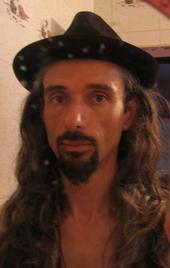English/Français/Español
Olivier Milchberg born in Paris, November 7th, 1963. He studied piano and guitar, both classical and jazz for 10 years. At 19, he joined the group Los Incas, founded by his father Jorge Milchberg. He began as guitarist, then continued as flute solo.
The international tours and multiple recordings with Los Incas gave him a much experience as a poly-instrumentalist. He founded Muance Productions in 1988, both as a recording studio and for production of traditional music.
He shares his time between concerts, composition, artistic direction and as producer.
From 1998 on, he developed a passion for oriental music. In 1999 he joins the group Pêcheurs de Perles founded by the Irakien singer Mohamed Alnuma. Olivier Milchberg approaches music with a global conception.
This approach brought him to play numerous instruments traditional or ethnic, like bouzouki (Greek and Irish) and cumbus (Turkish banjo). He’s had a passion since a very young age for reed and bamboo flutes like the “Kena”, “bansouri flute” from India, the ney.
Finally, his ear and mastery of rythm enable him to play the different percussion instruments with ease. His musical research is more than all based on music with soul and roots, in which his inspiration comes for the development of his personal expression.
—————————-
Né à Paris le 7 novembre 1963, il y étudie le piano et la guitare, classique et jazz, pendant dix ans. Il rejoint à 19 ans le groupe Los Incas fondé par son père Jorge Milchberg, en tant que guitariste, puis devient flûtiste soliste.
Les tournées internationales et les enregistrements avec Los Incas lui donnent une grande expérience poly-instrumentale.
Il fonde en 1988 Muance Productions, structure de production de musiques traditionnelles et studio d’enregistrement. Il partage son temps entre les concerts, la composition, la direction artistique et la production discographique.
Il collabore avec de nombreux musiciens de traditions musicales diverses, tels que Sergei Starostin (Russie), Christian Zagaria (médiéval-Oriental), accompagne Delphine Aguilera et Hombeline (chants Occitans), intègre les groupe Bandzydeco (Cajun), Kapela (musiques de l’est), Passe Montagne (bals folks), Balkanic Trio (de l’Europe à l’Orient).
Il rencontre et rejoint en 1999 l’ensemble Pêcheurs de Perles fondé par le chanteur iraquien Mohamed Alnuma, collabore avec le chanteur palestinien Moneim Adwan.
Olivier Milchberg aborde la musique avec une conception globale d’arrangeur. Cette approche l’a amené à pratiquer de nombreux instruments, traditionnels ou ethniques, comme le bouzouki (grec et irlandais), le cumbus (banjo turc). Il s’est passionné depuis très jeune pour les flûtes de roseau et de bambou comme les kenas, les flûtes bansouri d’Inde, le ney. Enfin, son oreille et sa maîtrise du rythme lui permettent de jouer des percussions avec aisance. Sa recherche porte avant tout sur les musiques qui ont une âme et des racines, dont il s’inspire pour développer son expression propre.
———————————————-
Olivier Milchberg nació en ParÃs el 7 de Noviembre de 1963,
Estudió piano y guitarra, clásica y jazz, durante diez años.
A los 19 años se unió como guitarrista al grupo Los Incas fundado por su padre Jorge Milchberg, para convertirse luego en flautista.
Las giras internacionales y las grabaciones con Los Incas le han han permitido acumular una gran experiencia poli-instrumental.
En 1998 funda “Muance Productions”, estructura de producción de músicas tradicionales y estudio de grabación.
Reparte su tiempo entre los conciertos, la dirección artÃstica y la producción discográfica.
A partir de 1998 se apasiona particularmente por las músicas orientales.
En 1999 integra el conjunto Pêcheurs de Perles fundado por el cantante iraquà Mohamed Alnuma.
Olivier Milchberg aborda la música con una concepción global.
Este enfoque le permite practicar numerosos instrumentos, tradicionales o étnicos, como el bouzouki ( griego e irlandés) o el cumbus (banjo turco); desde muy jóven siente pasión por las flautas de caña y de bambú como las kenas, las flautas bansouri de India o el ney. Su oÃdo y su conocimiento del ritmo le permiten tocar percusiones con facilidad.
Su investigación se ocupa sobre todo de las músicas que poseen un alma y unas raÃces, en las cuales se inspira para desarrollar su propia expresión.
